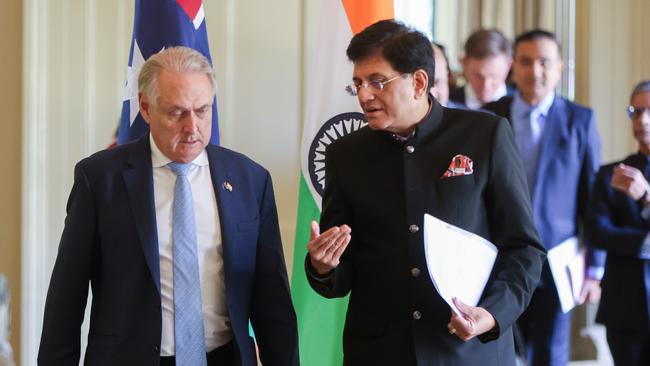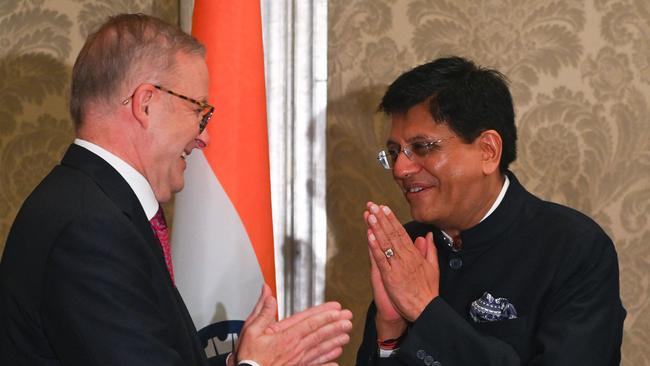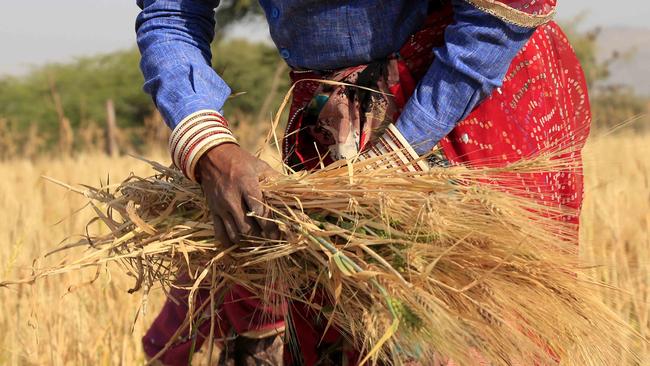India’s campus equation ‘a win for all’
India’s network of engineering and technology institutions could also set up campuses in Australia under deals offered by visiting Indian Commerce and Industry Minister Piyush Goya.

India is stepping up its bid to attract Australia’s multi-billion dollar tertiary education industry, opening opportunities for Australian universities to set up campuses in the country and lobbying for its own network of engineering and technology institutions to set up campuses here.
In an exclusive interview with The Australian, visiting Indian Commerce and Industry Minister Piyush Goyal said talks had begun with many Australian universities and declared the process, “once ignited, will be unstoppable”.
In a wide-ranging discussion Mr Goyal also pledged India’s enthusiastic support for the Quad, highlighted the advantages of trade with democratic India (“where the rule of law prevails”) over China, and stated his hope that the interim free-trade deal between India and Australia signed in 2022 could be completed early next year.
On Wednesday Mr Goyal met Trade Minister Don Farrell in Adelaide for the 19th India-Australia Joint Ministerial Commission to discuss co-operation in critical minerals, manufacturing, education, renewable energy, infrastructure, tourism and space.
Mr Goyal’s push for Australian tertiary institutions to set up in India comes with a counter-bid to establish campuses in Australia of Indian Institutes of Technology (IITs), highly regarded for their engineering qualifications, and Indian Institutes of Management (IIMs), the country’s MBA-producing business schools.
“Then we’ll be looking at mutual recognition agreements so that our quality standards and Australia’s quality standards can get integrated,” Mr Goyal said.
“My education ministry is talking to various stakeholders; it will be a process that, once ignited, will be unstoppable.”
India’s new National Education Policy, which has opened up the country to overseas universities, comes at a propitious moment for Australian universities seeking to circumvent the Albanese government’s caps on international students.
Victoria has announced it will provide $5m in incentives for universities and TAFEs to set up campuses overseas, after RMIT created a dual degree with India’s BITS Pilani university, with students splitting half their study in each country.
This year, Deakin University became the first foreign tertiary institution to open a branch campus in India, quickly followed by Wollongong University, with admission criteria and course requirements identical to those in Australia, and academic standards aligned with Australia’s national accreditation body.

Australia and India last year signed a mutual recognition agreement in which both countries recognise each other’s tertiary qualifications.
New regulations also allow Australian universities to fully repatriate profits earned in India to the parent institution without any restrictions.
The value of Australian agricultural exports to India increased by more than 100 per cent in 2022-23 after the Economic Co-operation and Trade Agreement (ECTA) was signed by the two countries in December 2022, although the beef and dairy industries remain a stumbling block to a final deal.
India has traditionally adopted a protectionist policy in agriculture because its farmers have political clout, but Mr Goyal argued this was “not protectionist, per se”, but a recognition of different farming circumstances.
“Our farmers’ average land holding is anywhere between two to three or four acres. Now they cannot ever be expected to compete with an Australian farmer who has maybe 1000 acres or 5000 acres, so you are looking at chalk and cheese.
“I must compliment the Australian leadership on all sides of the divide for their sensitivity in appreciating this, and therefore that never became a sticking point. On the contrary, the Australian government has offered to help these small farmers to improve their productivity, to increase their incomes.”
He described Senator Farrell as “My good friend, whom I lovingly call Godfather,” hastening to explain the term was not a reference to any mafia-like qualities, but to his “amiable personality, his lovely smile” and because “he’s the elder amongst many of us trade ministers – he’s always there to help”.

Mr Goyal said he was confident ECTA could become a fully-fledged free-trade agreement by early next year, although elections in his home state in November and the pending federal election in Australia might delay it.
“I don’t know whether we’ll be able to complete all the work, given the busy schedules that Don and I and our teams have, but I’m quite sure that we are both endeavouring to finish it ASAP, probably just before the election or just after your election,” he said.
The visit to Australia last year by Prime Minister Narendra Modi had been crucial in strengthening the relationship between the countries, Mr Goyal said, “maturing into very deep bonding, as we ministers started getting to know each other and reconnecting old ties, we realised that the potential is immense”.
Mr Goyal recalled how Anthony Albanese had called Mr Modi “the boss”, likening him to Bruce Springsteen, at a stadium event for 20,000 members of Australia’s Indian diaspora.
Mr Modi was “widely recognised as the most popular leader in the world”, Mr Goyal said. “It was for no small reason that Prime Minister Albanese thought it fit to call him the boss. And every Indian now knows Prime Minister Albanese because of that.”
Mr Goyal said he was not worried about competition from Australia’s renewed trade relationship with China, pointedly observing that India “comes to Australia with the three ‘D’ advantages.”
“First, we are a democracy. I think Australians recognise that in a country where the rule of law prevails, their investors, their business persons, won’t disappear overnight. You will have the rule of law protecting you, your investments, your traders.
“The second is our demographic dividend, the young population. Our average age is only 28.4 years, so we’ll be able to provide an opportunity where young, aspirational India is willing to put in hard work.
“And the third is, of course, demand – 1.4 billion Indians and the world’s fastest-growing large economy, expected to grow from a $3.5 trillion to a $35 trillion economy by 2047, when we celebrate 100 years of independence.”
Mr Goyal dismissed suggestions the Quad was weakened by a US President and Japanese Prime Minister both soon to leave office, and an Australian Prime Minister facing an upcoming election.
“Not at all,” he said. “These four countries are natural partners, natural allies, irrespective of the election result in Australia or elsewhere and I’m sure will keep this momentum going, and we’ll have a great future.”




To join the conversation, please log in. Don't have an account? Register
Join the conversation, you are commenting as Logout